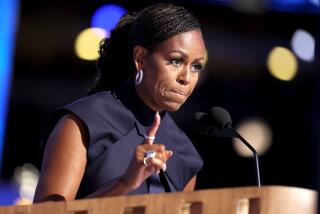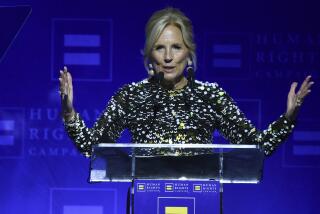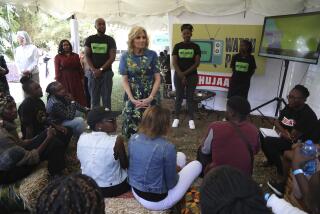Mrs. Clinton, at Summit, Pushes Female Literacy
- Share via
COPENHAGEN — First Lady Hillary Rodham Clinton arrived Tuesday at the U.N. World Summit for Social Development here to make her first major speech since November’s congressional elections, announcing a new U.S. initiative to fight world female illiteracy.
She cited disturbing statistics on poverty among women worldwide, noting that more than two-thirds of all school dropouts are girls and that two-thirds of the world’s 1 billion illiterate adults are women. Women also constitute a disproportionate share of those living in absolute poverty, she said.
“Investing in the health and education of women and girls is essential to improving global prosperity,” she said. “I am glad that this summit has endorsed the principle of equal rights and opportunities for women.”
Mrs. Clinton said she would offer specifics of her female-literacy campaign today when she participates in summit activities organized around International Women’s Day.
In targeting girls and women in her speech, Mrs. Clinton addressed one of the ideological sticking points bedeviling the summit, where thousands of delegates have been laboring over a long anti-poverty resolution that is to be endorsed by the week’s end. Among the many touchy passages in the draft are those calling for greater powers for women and those referring to “the family.”
The First Lady also chided foreign-aid naysayers, who too often assume “that any solution will inevitably be costly and complicated.” Although she did not specify whom her remarks were aimed at, they appeared to be targeted at Republicans who assumed control of the Congress in November; they hope for drastic reductions in foreign aid this year, arguing that the money tends to be siphoned away while the poor keep getting poorer.
“In fact, we have proof to the contrary,” she asserted, citing successful but low-tech and relatively low-cost international drives to promote breast-feeding, health care for pregnant women, immunizations for children and oral-rehydration therapy in places where the drinking water is unsafe.
She added that America itself doesn’t always measure up on such basic health-care measures, complaining that U.S. child-immunization rates “are not yet where they need to be” and praising a Philippine hospital where new mothers are kept in the maternity ward long enough to establish breast-feeding--in contrast to the U.S. practice of discharging new mothers as quickly as possible.
“Her speech was very inspiring, because she concentrated on the human being,” said Bhola Sah, a representative of Amurt, an Indian disaster-relief group. She echoed the frustration widely felt this week by hundreds of charity workers who have come here for the summit only to find official delegates and their activities sealed off behind a daunting array of security guards, metal detectors and police dogs.
Charity representatives were further disappointed--as were the summit’s U.N. organizers--by President Clinton’s decision not to attend this event. He is sending Vice President Al Gore this weekend.
More to Read
Sign up for Essential California
The most important California stories and recommendations in your inbox every morning.
You may occasionally receive promotional content from the Los Angeles Times.










